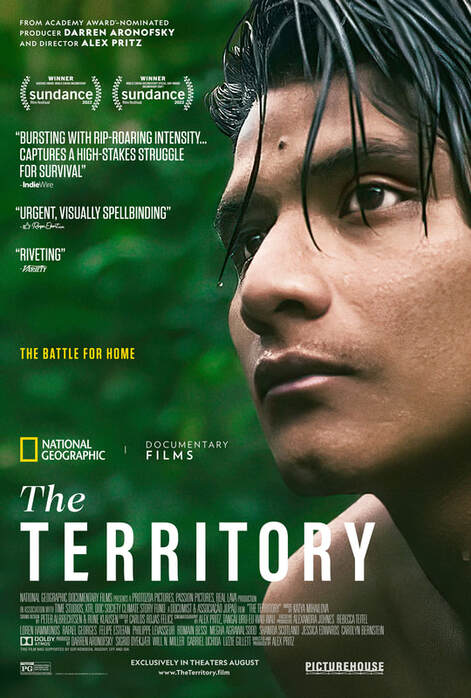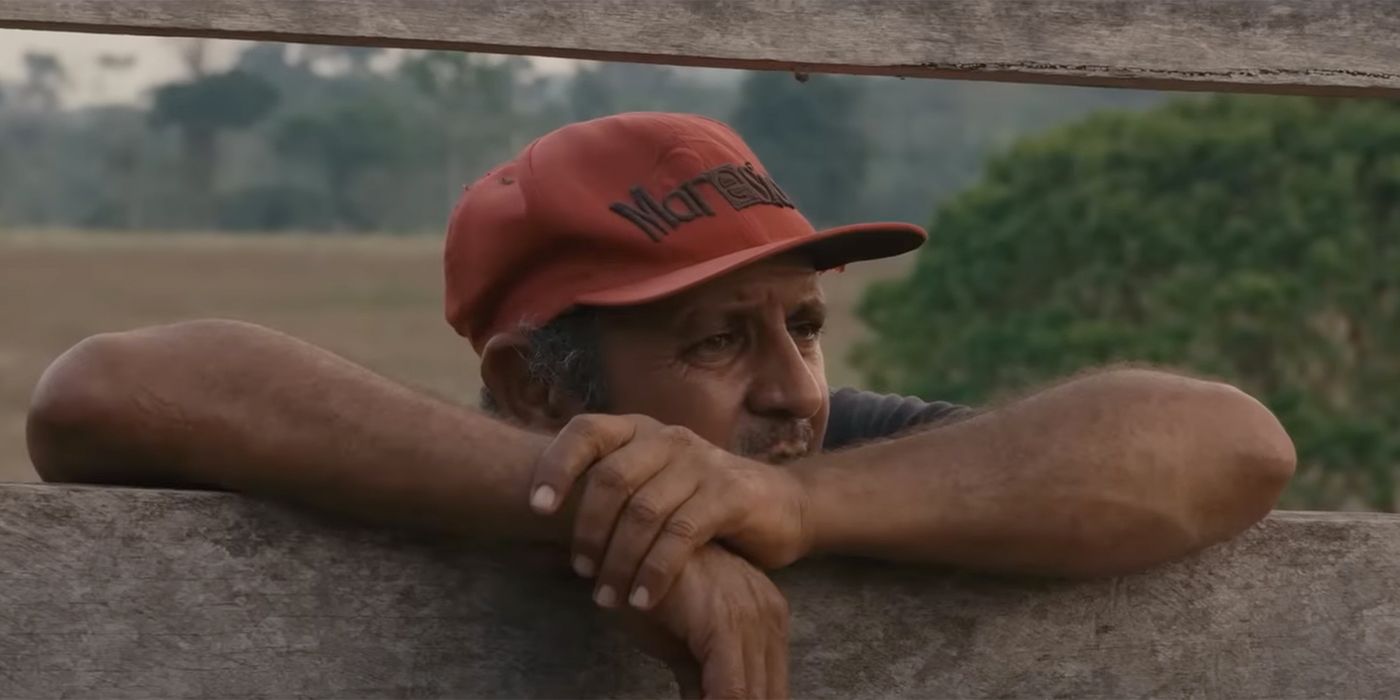“Bursting with rip-roaring intensity…Captures a high-stakes struggle for survival.”
–IndieWire
“Urgent. Visually spellbinding.”
–RogerEbert.com
“Riveting.”
–Variety
–IndieWire
“Urgent. Visually spellbinding.”
–RogerEbert.com
“Riveting.”
–Variety

Reviewed by Amil Niazi | The Globe and Mail
In the 1980s the Brazilian government made contact with the Uru-Eu-Wau-Wau people, an Indigenous tribe living in the Amazon rainforest, in the Brazilian state of Rondônia. Though their population was in the thousands pre-contact, outsiders brought in disease which took their numbers down to less than a hundred by the early 90s. Today there are estimated to be around 200 left. Despite being granted protection of their land by the government in 1993, those remaining face constant threats from loggers and settlers – emboldened by current Brazilian president Jair Bolsonaro – who illegally invade, deforest and settle the Uru-Eu-Wau-Wau territory, turning it into farmland.
A new documentary called The Territory, explores this tension, following both the tribe and their invaders, bringing the viewer up close and personal into this desperate fight to save the rainforest. Directed by Alex Pritz and co-produced by Darren Aronofsky, the film is a stunningly intimate look at the stakes surrounding this conflict, shot over three years with remarkable clarity and beauty by Pritz and Tangãi Uru-eu-wau-wau, a member of the tribe.
Particularly captivating are a young man named Bitaté, chosen to lead the tribe at just 18 and Neidinha, a dedicated environmental activist committed to helping the Uru-Eu-Wau-Wau protect and maintain their territory. Both of them believe the Amazon to be the heart of, not just Brazil, but the world and risk their lives daily to secure what little of it remains in their stewardship.
We also meet farmer Sergio, a leader in his own right, of a group of ambitious invaders who are chainsawing and burning their way through the protected land in order to create a new community of farmers. He and his men are outlaws who believe themselves to be pioneers rather than criminals and consider the land theirs to take. And with Bolsonaro in power, there is very little, other than the Uru-Eu-Wau-Wau, standing in their way.
When the murder of a tribal leader tips the scales on the mounting tension, Bitaté realizes he must galvanize his people or lose everything they’ve fought so fiercely to maintain.
Pritz, who studied Environmental Science at McGill University in Montreal before turning to directing and cinematography, manages to create a constant sense of anxiety and tension without manipulation. With such intimate, incredible access to both sides, you can’t help but be intensely invested in the fierce life and death battle happening on the borders of this forest. Where one side is as close to its rivers and trees as their own families and the other is looking for their own personal slice of the capitalist dream. The lens here is unsparing because the fight is so visceral, so tense, so all encompassing and so universally applicable you feel the stakes rise as though you were right there on the edge of the Amazon alongside the Uru-Eu-Wau-Wau. Especially captivating is the drone footage captured by the tribe that shows, with absolute certainty, how decimated so much of the rainforest already is, and how narrowly their people are hanging on to what’s left. Composer Katya Mihailova’s haunting sound design helps elevate both the beauty and the brutality taking place.
It’s hard not to see the parallels between the land the Uru-Eu-Wau-Wau are desperate to save, not just for themselves but for the sanctity of the planet, and similar fights right here in Canada in places like Fairy Creek on Vancouver Island, where protesters have been defending old growth trees from logging.
The Territory is difficult but perhaps necessary viewing for anyone concerned about climate change and the micro and macro battles taking place across the world to prevent further damage to the very forests and trees that help maintain the health of our world. Pritz has managed to make this often abstract and far-away subject feel anything but removed. It’s urgent, desperate and terrifying and the words of the Uru-Eu-Wau-Wau ask us not to look away.
In the 1980s the Brazilian government made contact with the Uru-Eu-Wau-Wau people, an Indigenous tribe living in the Amazon rainforest, in the Brazilian state of Rondônia. Though their population was in the thousands pre-contact, outsiders brought in disease which took their numbers down to less than a hundred by the early 90s. Today there are estimated to be around 200 left. Despite being granted protection of their land by the government in 1993, those remaining face constant threats from loggers and settlers – emboldened by current Brazilian president Jair Bolsonaro – who illegally invade, deforest and settle the Uru-Eu-Wau-Wau territory, turning it into farmland.
A new documentary called The Territory, explores this tension, following both the tribe and their invaders, bringing the viewer up close and personal into this desperate fight to save the rainforest. Directed by Alex Pritz and co-produced by Darren Aronofsky, the film is a stunningly intimate look at the stakes surrounding this conflict, shot over three years with remarkable clarity and beauty by Pritz and Tangãi Uru-eu-wau-wau, a member of the tribe.
Particularly captivating are a young man named Bitaté, chosen to lead the tribe at just 18 and Neidinha, a dedicated environmental activist committed to helping the Uru-Eu-Wau-Wau protect and maintain their territory. Both of them believe the Amazon to be the heart of, not just Brazil, but the world and risk their lives daily to secure what little of it remains in their stewardship.
We also meet farmer Sergio, a leader in his own right, of a group of ambitious invaders who are chainsawing and burning their way through the protected land in order to create a new community of farmers. He and his men are outlaws who believe themselves to be pioneers rather than criminals and consider the land theirs to take. And with Bolsonaro in power, there is very little, other than the Uru-Eu-Wau-Wau, standing in their way.
When the murder of a tribal leader tips the scales on the mounting tension, Bitaté realizes he must galvanize his people or lose everything they’ve fought so fiercely to maintain.
Pritz, who studied Environmental Science at McGill University in Montreal before turning to directing and cinematography, manages to create a constant sense of anxiety and tension without manipulation. With such intimate, incredible access to both sides, you can’t help but be intensely invested in the fierce life and death battle happening on the borders of this forest. Where one side is as close to its rivers and trees as their own families and the other is looking for their own personal slice of the capitalist dream. The lens here is unsparing because the fight is so visceral, so tense, so all encompassing and so universally applicable you feel the stakes rise as though you were right there on the edge of the Amazon alongside the Uru-Eu-Wau-Wau. Especially captivating is the drone footage captured by the tribe that shows, with absolute certainty, how decimated so much of the rainforest already is, and how narrowly their people are hanging on to what’s left. Composer Katya Mihailova’s haunting sound design helps elevate both the beauty and the brutality taking place.
It’s hard not to see the parallels between the land the Uru-Eu-Wau-Wau are desperate to save, not just for themselves but for the sanctity of the planet, and similar fights right here in Canada in places like Fairy Creek on Vancouver Island, where protesters have been defending old growth trees from logging.
The Territory is difficult but perhaps necessary viewing for anyone concerned about climate change and the micro and macro battles taking place across the world to prevent further damage to the very forests and trees that help maintain the health of our world. Pritz has managed to make this often abstract and far-away subject feel anything but removed. It’s urgent, desperate and terrifying and the words of the Uru-Eu-Wau-Wau ask us not to look away.









